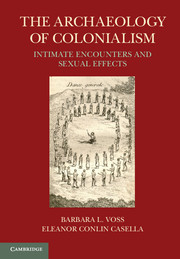Two - Sexual Effects
Postcolonial and Queer Perspectives on the Archaeology of Sexuality and Empire
Published online by Cambridge University Press: 05 June 2012
Summary
Introduction
The Archaeology of Colonialism: Intimate Encounters and Sexual Effects seeks to forge a strong connection between two bodies of scholarship that have to date been only weakly linked. The first of these is the increasingly dynamic examination of the sexual politics of empire. With particular emphasis on the European empires of the past two centuries, feminist and postcolonial scholarship has richly demonstrated that sexuality is central to colonial projects. It is now axiomatic that empires produce and rely on “tense and tender ties” (Stoler 2001) that bind together political, institutional, economic, emotive, and familial aspects of social life in both the metropole and the colony.
The second body of scholarship consists of the explosion of archaeological research on colonization, spurred in part by milestone anniversaries such as the 1988 Australian Bicentennial, the 1992 Columbian Quincentennial, and Great Britain's recent commemorations of the 1807 Slave Trade Act. Simultaneously, a growing awareness of archaeology's origins as a colonial, and colonizing, project has generated a new reflexive interest in the relationship between archaeology and empire. Informed by postcolonial and indigenous scholarship, recent archaeological investigations have brought fine-grained attention to the materiality of colonial projects. Increasing, archaeological investigations center on questions of creolization, ethnogenesis, hybridity, and syncretism – themes that point toward the intimate entanglements produced through colonial encounters.
- Type
- Chapter
- Information
- The Archaeology of ColonialismIntimate Encounters and Sexual Effects, pp. 11 - 28Publisher: Cambridge University PressPrint publication year: 2011
References
- 4
- Cited by

